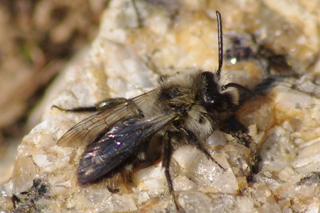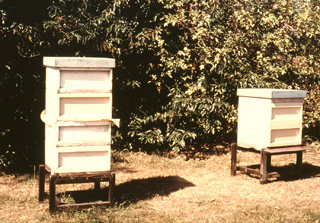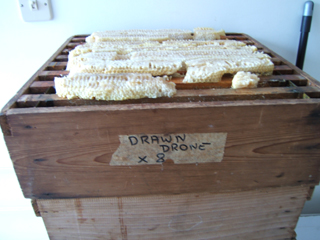 I have been keeping bees for nearly 18 years now and this has been my busiest ever season. What with the weather starting off so mild and the colonies building up so early, not only did I get a “Spring crop” of honey (which normally only happens about every four or five years) but the colonies were able to build up even further on the winter sown rape. Some colonies even produced an excess of rape honey, but this unfortunately became mixed with the spring blossom honey such as blackthorn, hawthorn and the like.
I have been keeping bees for nearly 18 years now and this has been my busiest ever season. What with the weather starting off so mild and the colonies building up so early, not only did I get a “Spring crop” of honey (which normally only happens about every four or five years) but the colonies were able to build up even further on the winter sown rape. Some colonies even produced an excess of rape honey, but this unfortunately became mixed with the spring blossom honey such as blackthorn, hawthorn and the like.
However, it meant that colonies built up very strong in bee numbers, so I could do some queen rearing and was able to concentrate on production of Cornish black bees. I also moved my non-Cornish bees to out-apiaries pending future re-queening operations next year, which meant that any mating virgin queens were not troubled by any of my non-Cornish drones.
Then we had the summer months, bringing in a surplus of blossom honey from the summer flowering plants, and where we normally find that June is a “dead” month, with very few plants in flower and therefore no food for the bees, this year the “June gap” didn’t materialise and the bees were able to continue foraging non-stop, producing one of my best summer honey crops ever.

Not content with that, the ivy started flowering right at the beginning of September – and is still going strong- allowing the bees not only to bring in an adequate supply of nectar and pollen for their winter requirements but also a surplus for me. A lot of beekeepers absolutely hate ivy honey because it granulates very quickly, generally whilst still in the comb. Also, it has a distinctive taste – like Marmite, loved by some, hated by many!
This is the first time I’ve had an ivy crop for about six years – and its size has been about the same as the summer crop. Although I have only just finished extracting my summer crop, so have only now started extracting the ivy crop, I would say my total honey harvest this year must be in the order of 750lbs of honey! Quite a yield for a hobbyist beekeeper, so I am well pleased.
I am even more pleased, though, for the bees. They have more than sufficient stores of honey and pollen to see them through the winter without me having to resort to artificial feeding with sugar syrup. The poor autumn last year meant many colonies across the UK did not have enough pollen stores to see them through the winter and many died out (though fortunately none of mine).
Bees need a lot of pollen to build up their “fat bodies” in readiness for the winter, so whereas last year they went into winter ill-prepared, since there had been little pollen available, this year there is no likelihood of a repeat, so I am optimistic about their likely survival through whatever the winter throws at them and about the season that awaits us next year. Mind you, beekeepers always are optimists, relying on the fact that next year will be “the year” for large honey harvests and lots of bees!
 As I said last time, autumn for the beekeeper is the time for consolidation of small colonies, since larger colonies stand a better chance of survival owing to their greater ability to maintain the cluster temperature (which is 35ºC if there is brood present or about 20ºC if there is no brood. Down here in Cornwall, though, it rarely gets cold enough for the queen to stop laying altogether, so there is generally brood present in the hive throughout the winter). Since I had produced several nucleus colonies (which are a lot smaller than standard colonies) during the season, I thought it was highly likely I would have to unite some of these smaller units to obtain sufficiently sized colonies to enter the winter.
As I said last time, autumn for the beekeeper is the time for consolidation of small colonies, since larger colonies stand a better chance of survival owing to their greater ability to maintain the cluster temperature (which is 35ºC if there is brood present or about 20ºC if there is no brood. Down here in Cornwall, though, it rarely gets cold enough for the queen to stop laying altogether, so there is generally brood present in the hive throughout the winter). Since I had produced several nucleus colonies (which are a lot smaller than standard colonies) during the season, I thought it was highly likely I would have to unite some of these smaller units to obtain sufficiently sized colonies to enter the winter.
However, because of the weather being so mild (who says there’s no global warming?!), all the nuclei I created have needed to be moved onto full-sized hives and have grown like topsy since. This means all my colonies are full-sized with enough bees to see them through the winter and with enough (ivy) stores to provide them with their carbohydrate and pollen requirements until the Spring.
I have lost two colonies to robbing (by wasps mainly, but also bees), without my noticing. I had seen activity in front of the hives but it had not appeared unusual in any way. The robbers must have been creeping in through undefended openings, acquired the scent of the colony by their presence, and continued to return to plunder, flying in the same manner as the legal occupants of the hive. However,the small colony I referred to last time that was being robbed is still doing well and is holding its own. I have high hopes for this one in particular, since it appears to have the survival instinct so necessary in Nature – we shall see!.
One other colony went queenless for whatever reason, so I have united the remnants of that with another colony, just to allow the bees that remain to provide a short-term boost for the good colony. Colonies go queenless for many reasons – the queen dies prematurely; the queen is rejected by the bees; the queen did not mate properly when she was a virgin and so runs out of sperm, capable only of laying drone brood; and so on. Some things in beekeeping just cannot be explained but we must analyse the situation the bees provide us with and take appropriate action to assist them where possible.
 This I have done and now all that I have left to do is finish the extraction of my ivy honey. This could take an elapsed time of many weeks as each comb of honey has either to be cut from its wooden frame and melted down or scraped back to the septum (basically the central part of the comb between the two sets of cells on either side) and the resulting mess of wax and honey melted. On cooling, the wax rises to the surface and eventually solidifies, enabling it to be removed leaving the liquid honey behind.
This I have done and now all that I have left to do is finish the extraction of my ivy honey. This could take an elapsed time of many weeks as each comb of honey has either to be cut from its wooden frame and melted down or scraped back to the septum (basically the central part of the comb between the two sets of cells on either side) and the resulting mess of wax and honey melted. On cooling, the wax rises to the surface and eventually solidifies, enabling it to be removed leaving the liquid honey behind.
This is then immediately bottled. It is imperative to act quickly and not leave the separated ivy honey unbottled for anything more than about a day, otherwise the whole mass will solidify and it is notoriously difficult to warm a large mass of honey sufficiently to allow it to reach a run state for bottling. It’s a long, slow process!
Meantime, my winter beekeeping course has started and I have 17 students, which is excellent. Experience has shown that all attendees actually take up the craft, so our numbers are slowly increasing all the time. We need more bees in the UK and each term another group of new beekeepers is added to the growing number across the country, thereby increasing the number of bees. These new beekeepers are a positive sign for the future of beekeeping and our planet.
Colin Rees 01872 501313 colinbeeman@aol.com

